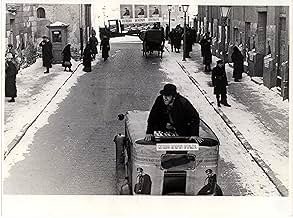Uno scrittore e il suo assistente stanno lavorando a una storia biblica su Ponzio Pilato che condannò Gesù di Nazereth, mentre Satana e i suoi luogotenenti stanno molestando il duo di scritt... Leggi tuttoUno scrittore e il suo assistente stanno lavorando a una storia biblica su Ponzio Pilato che condannò Gesù di Nazereth, mentre Satana e i suoi luogotenenti stanno molestando il duo di scrittori in vari modi.Uno scrittore e il suo assistente stanno lavorando a una storia biblica su Ponzio Pilato che condannò Gesù di Nazereth, mentre Satana e i suoi luogotenenti stanno molestando il duo di scrittori in vari modi.
- Premi
- 3 vittorie e 1 candidatura
Velimir 'Bata' Zivojinovic
- Korovjev
- (as Bata Zivojinovic)
Pavle Vuisic
- Azazelo
- (as Pavle Vujisic)
Danilo 'Bata' Stojkovic
- Bobov
- (as Danilo Stojkovic)
Trama
Lo sapevi?
- QuizAs of 2016 it was included in the #100 Serbian movies list (1911-1999) and protected as cultural heritage of great importance.
- Versioni alternativeThere are several subtle differences between the Italian and Serbian language cuts of the film. The dubbed French version is based on the Serbian Cut. Removed from the Serbian Cut: Ennio Morricone's theme that plays throughout the Italian Cut is missing from the Serbian Cut. In Nikolai's play, Pontius Pilate orders the assassination of Judas Iscariot. Nikolai encounters a friend at a train station who asks him if he has withdrawn the play. Nikolai replies that he hasn't. The friend goes on to complain that he had only been given 20 pieces of paper to write his novel. Nikolai replies that it's not a problem for him as he writes his plays on his wall. After burning his play, Nikolai enters the theatre office, asking if the play will be rehearsed today. An attendant informs him there will not be a rehearsal that day. Added to the Serbian Cut: A shot of Nikolai walking in the street before entering the Café. He is being watched by Korovjev. After Margarita and Nikolai first meet and get into a car, Margarita looks out the car window and a POV-shot of the street (similar to the opening credits) is seen. After Rimski leaves Nikolai's apartment and Nikolai lights a cigarette, he looks up and sees Margarita with a small photo of Nikolai in front of her left eye. She smiles and cries. The scene then moves to Oskar Danilovic outside the house looking at a parade of soldiers. The Italian Cut resumes when Danilovic continues walking down the street. A shot of Nikolai walking up the stairs before entering the dance hall to confront Rimski. More footage of Nikolai looking at the asylum inmates in courtyard.
- ConnessioniRemade as Il maestro e Margherita (2023)
Recensione in evidenza
Aleksandar Petrovic's 'Maestro e Margherita, II (1972) is a visual masterpiece and probably the most important 'dissident' movie from former Yugoslavia. Unlike other dissident films such as 'Kako Sam Sistematski Unisten od Idiota' or 'Varljivo Leto '68' it is brave, straightforward, intelligent and funny. On the other hand, its criticism of greed and hypocrisy resembles the work of yet another Yugoslav director, Dusan Makavejev's 'Sweet Movie'.Although the film retains opulent 'mysticism' and spirituality of Bulgakov's novel 'Master and Margarita' it nevertheless additionally depicts local atmosphere and political circumstances of than uncomfortable Yugoslav reality. The film was banned for about 20 years. However, it successfully survives and continues to present recent past in an unique and brave way.
I più visti
Accedi per valutare e creare un elenco di titoli salvati per ottenere consigli personalizzati
- How long is The Master and Margaret?Powered by Alexa
Dettagli
- Tempo di esecuzione1 ora 35 minuti
- Mix di suoni
- Proporzioni
- 1.85 : 1
Contribuisci a questa pagina
Suggerisci una modifica o aggiungi i contenuti mancanti

Divario superiore
By what name was Il maestro e Margherita (1972) officially released in Canada in English?
Rispondi
























